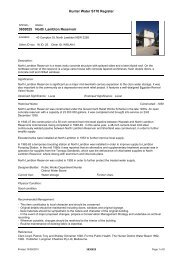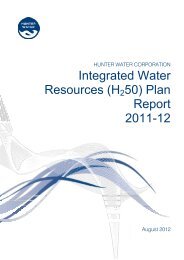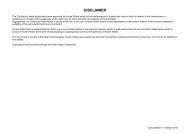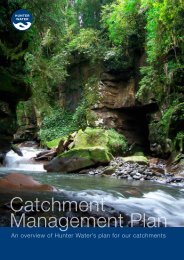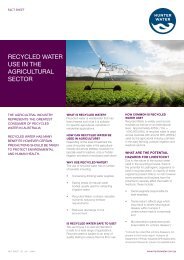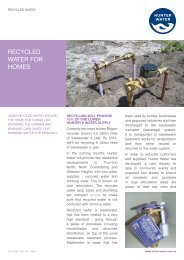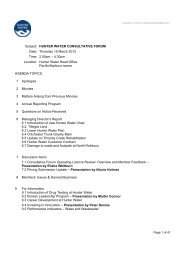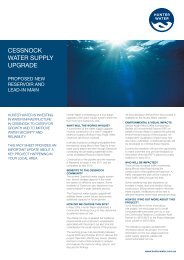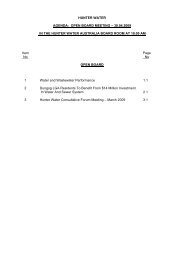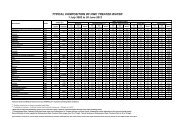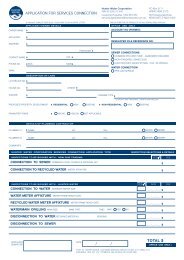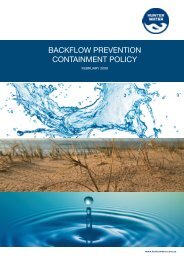Water Kit - Hunter Water
Water Kit - Hunter Water
Water Kit - Hunter Water
You also want an ePaper? Increase the reach of your titles
YUMPU automatically turns print PDFs into web optimized ePapers that Google loves.
1.10 landcare and waterways<br />
What is Landcare?<br />
Landcare is an Australian environmental<br />
movement based on groups of<br />
volunteers who work in their local area<br />
and ‘adopt’ a site to restore or maintain.<br />
Some Landcare groups conduct<br />
education programs but most work is<br />
hands-on work for the environment.<br />
Landcare and waterways<br />
Many Landcare projects near waterways<br />
typically involve revegetation, weeding,<br />
erosion control, water quality testing,<br />
litter control and habitat creation for<br />
native wildlife. The benefits of Landcare<br />
for our waterways are:<br />
Environmental<br />
• Revegetation of riverbanks and<br />
wetlands increases biodiversity and<br />
reduces erosion, which stabilises<br />
the soil and improves soil and water<br />
quality<br />
• Building mounds and swales can<br />
redirect runoff and slow water flow,<br />
thereby reducing erosion<br />
• Reducing weeds and litter improves<br />
the health and amenity of the local<br />
area<br />
• Conducting water quality monitoring<br />
contributes to water quality<br />
databases eg <strong>Water</strong>watch to help us<br />
understand our local waterways and<br />
how we can manage them better<br />
Social<br />
• School students and community<br />
members gain practical skills and<br />
knowledge through being involved in<br />
Landcare and <strong>Water</strong>watch<br />
• People working together on local<br />
environmental problems generates<br />
community spirit<br />
Economic<br />
• Increasing the value of the land by<br />
restoring productivity and improving<br />
its amenity<br />
• Improved health of estuaries and<br />
wetlands help to maintain the<br />
breeding of fish and prawns which is<br />
an income source for the<br />
Lower <strong>Hunter</strong><br />
<strong>Water</strong> kit . ssS . 001 . april 2010<br />
Partnerships and cooperation<br />
In recent years all levels of government<br />
have begun to understand the<br />
contribution that Landcare groups make<br />
to local communities and environments.<br />
Many Landcare groups contribute<br />
skills and time towards a local project,<br />
while government agencies contribute<br />
financial support.<br />
People are often attracted to Landcare<br />
because projects are in the area that they<br />
live and they can see the direct benefits<br />
of caring for their local area. Landcare<br />
involves people from many different<br />
backgrounds working together. This<br />
cooperation means that resources can<br />
go further and more can be achieved.<br />
organisations that support<br />
Landcare in the <strong>Hunter</strong><br />
<strong>Hunter</strong> <strong>Water</strong><br />
<strong>Hunter</strong> <strong>Water</strong> has worked in partnership<br />
with Landcare groups in the Lower<br />
<strong>Hunter</strong> region for many years. Support<br />
is available to Landcare groups through<br />
an annual sponsorship program that<br />
funds on-ground works to revegetate<br />
and rehabilitate degraded land and<br />
waterways.<br />
<strong>Hunter</strong> <strong>Water</strong> also works directly with<br />
the <strong>Hunter</strong> Region Landcare Network to<br />
provide small grants to Landcare groups<br />
in its area of operations.<br />
<strong>Hunter</strong>-Central Rivers Catchment<br />
Management Authority<br />
The CMA is working to build links with<br />
community groups, business, industry<br />
and government throughout the region,<br />
ensuring that all interests and concerns<br />
are considered and that the responsibility<br />
for action is shared.<br />
The CMA’s project officers and<br />
Community Support officers provide<br />
direct assistance to landcare and<br />
community groups who help manage<br />
the region’s natural resources. <strong>Hunter</strong><br />
<strong>Water</strong> works directly with the CMA on<br />
catchment management activities in the<br />
Lower <strong>Hunter</strong>.<br />
Local councils<br />
Local councils are an important source<br />
of technical information and materials<br />
for environmental projects. Councils<br />
have a specific interest in their local<br />
areas and are often a first point of<br />
contact for Landcare groups setting<br />
up new projects. Many Councils<br />
have established grant programs to<br />
support landcare groups to tackle local<br />
environmental issues.<br />
Local schools<br />
Schools can form their own Landcare<br />
group or work cooperatively with a<br />
Landcare group from their community.<br />
For instance, Metford Public School<br />
formed their Landcare group in 1996.<br />
This group works with community<br />
members and are stewards of their local<br />
wetland – Melaleuca Ponds. Teachers<br />
and students regularly carry out water<br />
quality monitoring, litter removal,<br />
revegetation, and raise awareness<br />
in their local community about the<br />
importance of the ponds and working<br />
together to keep them clean.<br />
Holy Family Primary School Landcare<br />
group has established an on-site native<br />
plant nursery and supplies plants to<br />
other Landcare groups in their local area.<br />
Teachers and students have worked<br />
over several years to install a number<br />
of rainwater tanks that feed into an<br />
artificially created wetland on the school<br />
grounds.<br />
Landcare Actions in the <strong>Hunter</strong><br />
There are more than 300 landcare groups<br />
throughout the <strong>Hunter</strong> with a total<br />
membership of nearly 10,000 people.<br />
These groups work on many different<br />
projects - here is a sample of activities<br />
you may be involved in if you join a<br />
Landcare group.<br />
Earthcare Park East Maitland<br />
The Earthcare Park and Education<br />
Centre Landcare group has been<br />
working on the rehabilitation of degraded<br />
bushland and a portion of Tenambit<br />
Wetland since 1996.<br />
Their site activities began with removing<br />
cattle and then by conducting a series<br />
of environmental investigations of the<br />
sites flora, fauna, soils, archaeology and<br />
hydrology. The results helped to highlight<br />
the issues that needed attention.<br />
A plan of action was developed and<br />
funds raised to carry out rehabilitation<br />
and education. Monitoring and<br />
evaluation keeps track of the group’s<br />
outcomes. About 500 hours of volunteer<br />
24




